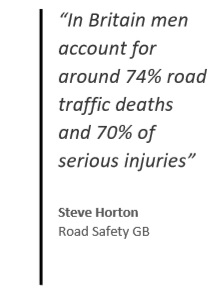
Analysis of DVLA data shows that despite holding 46% of UK driving licences, women are responsible for just 28% of the penalty points currently on record.
Published by Deadline News agency, the analysis shows that of the 10.6m penalty points attributed to licences on 10 March 2018, 7.7m (72%) were held by men.
The DVLA figures, obtained via a FOI request, also show that of the 1,840 drink-driving offences recorded in the last two years, 84% (1,543) involved men.
 Over the same period, 69% of speeding offences on public roads were committed by male drivers – rising to 78% on motorways. 82% of mobile phone offences also involved a male driver.
Over the same period, 69% of speeding offences on public roads were committed by male drivers – rising to 78% on motorways. 82% of mobile phone offences also involved a male driver.
54% (21.8m) of the 40.4m licence holders in Great Britain are male, compared to 18.5m female drivers.
Steve Horton, Road Safety GB’s director of communications, said: “What the data doesn’t indicate is the levels of mileage travelled by men and women and that could in some part indicate that men do more driving and hence have opportunity for more offences.
“It might also indicate that the police are more effective at targeting male drivers for certain offences.
“Of course offence levels aren’t necessarily an accurate illustration of perpetrator levels, just those detected.
“Many behaviours could be displayed by both men and women, like using a mobile phone. But for a variety of reasons more men may be detected doing it.
“In Britain men account for around 74% road traffic deaths and 70% of serious injuries, so there appears to be some link with men committing most offences and the fact mostly men are seriously injured in road crashes.
“This data confirms that road safety professionals are right to maintain a strong interest in influencing male driver behaviour, although they shouldn’t ignore the need to remind all drivers of certain important messages.”
I would not say that women make safer drivers judging what I have been subject to. The first is tailgating. I have been followed in the past by both men and women and by far the worst offenders are women, followed by workmen in vans. As the police do not seem to be able or willing to take action for this offence its not going to get any better and drivers will continue to tailgate. If an officer saw an offence of dangerous driving or of driving without due care and attention then they are more likely to do something about it. However, they fail to realise that tailgating comes within the definition of that offence. The second matter is as always women on phones, followed once again by workmen.
M.Worthington, Manchester
+1
I think it’s evenly split, although I would go so far as to suggest that when women speed and drive too close, it’s down to poor judgment, arising from poor realisation and understanding of the possible consequences – with men, I think it’s done in spite of better judgment and knowing the consequences i.e. the thrill of the moment, the chase and an underlying competitive streak…signs of immaturity perhaps? I know it’s a generalisation, but personal observation can reveal more than cold statistics.
Hugh Jones
--1
I’m not sure I need a survey to tell me women are generally far more considerate drivers than us men!
Ben Graham, Reading
+3
One’s personal observations daily of behaviour on the road, are more reliable for this sort of thing than statistics.
Hugh Jones
+3
Men drive further than women and the data is published by the DfT so it doesn’t take much effort to work out that there’s not as much to the story as it would appear. This type of story gets repeated every few years and it demonstrates the need to use a decent denominator in any analysis like this.
Richard Owen, Towcester
+10
Good to see that discussions and statistics on gender bias are still permissible and even appropriate in some subjects in these politically correct days.
Pat, Wales
+10